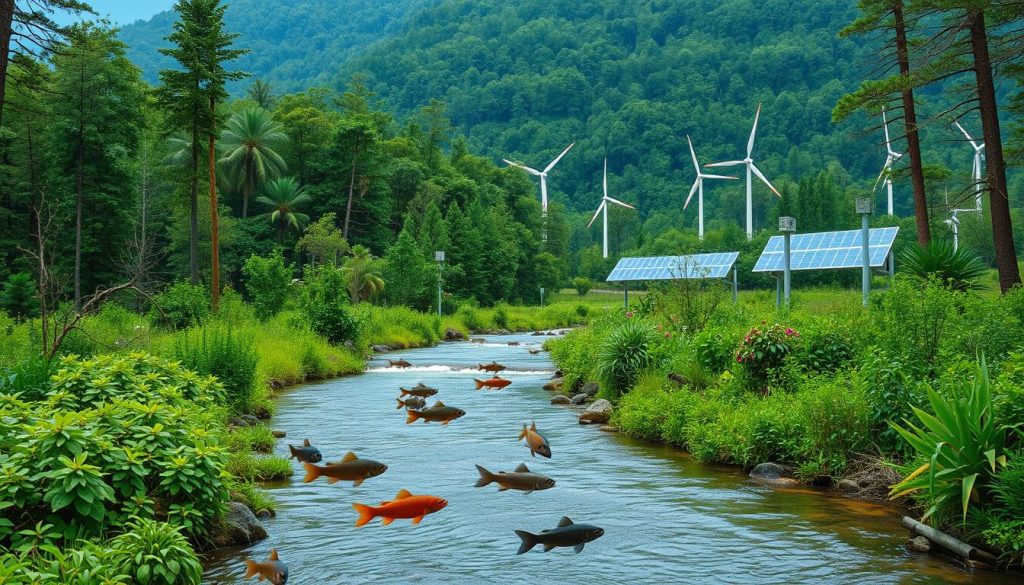Can our daily habits actually help fight climate change?
Our world now pays more attention to living sustainably and keeping the environment safe. It’s crucial to know and use eco-friendly habits in our lives. This article shows how to do that in many parts of our daily routines. It shows why these practices are important for a sustainable future.
We can lower how much we contribute to climate problems. And we can help in community projects that protect nature. Start using eco-friendly habits now. Be part of the change towards a greener and better future.
The Importance of Eco-Friendly Practices

Using eco-friendly methods is key to saving our environment. When we choose green living, we see benefits now and help our planet in the future. The World Wildlife Fund (WWF) talks about how living sustainably fights climate change and saves our ecosystems.
Friends of the Earth says that small green habits make a big difference. Doing things like wasting less, saving water, and choosing sustainable items helps lower our carbon footprint. It’s critical for keeping biodiversity and making our ecosystem healthier.
The Environmental Protection Act 1990 shows how we can all help protect the environment. Following its rules and living greener can make our communities better. Investing in clean energy, recycling, and buying green products moves us toward a sustainable future that’s good for all.
Simple Daily Habits to Reduce Carbon Footprint

Making small changes in our daily lives can have a big impact on lowering our carbon footprint. By choosing to live more sustainably, we help the environment. This is something we can all do.
Using Reusable Bags
One simple step is to start using reusable bags instead of single-use plastics. Plastic bags cause a lot of pollution. By choosing reusable options, we help reduce waste and support the environment. The Energy Saving Trust notes that plastic bag production and disposal add to greenhouse gas emissions.
Conserving Water
Water conservation is key in reducing our carbon footprint. Small steps, like fixing leaks, taking shorter showers, and opting for efficient appliances make a big difference. Waterwise explains that using water wisely saves a vital resource and cuts down on energy use for heating and pumping water.
Reducing Electricity Consumption
Lowering our electricity use is essential for a sustainable lifestyle. Using energy-efficient bulbs, unplugging devices, and buying efficient appliances can cut our energy use. The Carbon Trust tells us these small steps can significantly reduce carbon emissions from our homes. By doing these regularly, we develop habits that are good for our planet.
Green Transportation Options
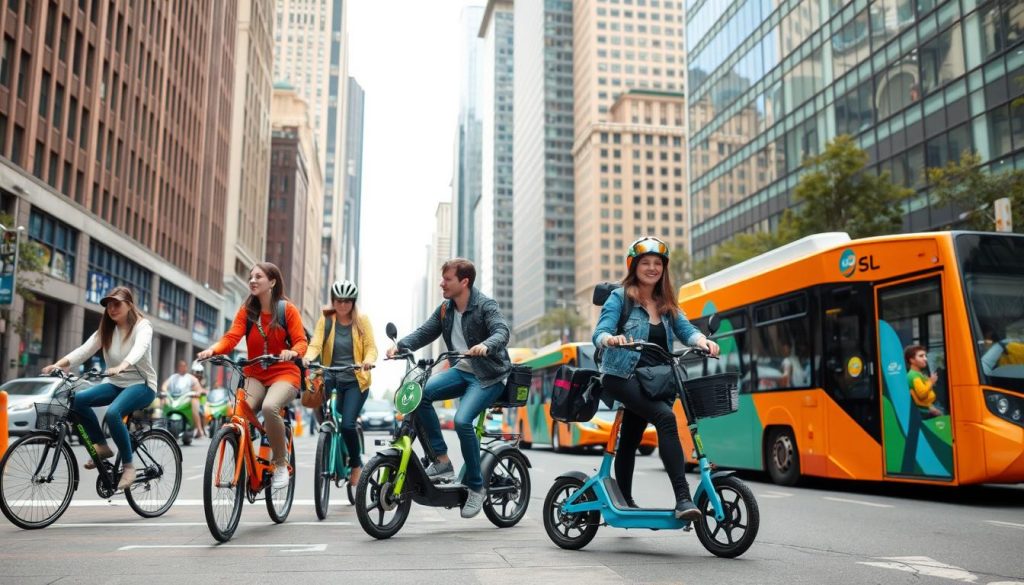
Choosing green ways to travel is key for a low carbon journey and eco-friendly trips. These options cut our use of fossil fuels, decrease carbon emissions, and clean up our cities. Here are some eco-smart travel choices that really matter.
Cycling to Work
Cycling is a top choice for green travel. When you cycle to work, you save money on fuel and cut your carbon emissions. Cycling UK says biking reduces traffic and pollution. Plus, it’s great for your health, making it a smart pick for green travel.
Using Public Transport
Public transport is vital for eco-friendly travel. Transport for London’s network moves lots of people at once, cutting the need for many cars. This saves on emissions and eases city traffic.
Carpooling
Carpooling is a smart way to travel green. Sharing rides means fewer cars on the road and less pollution. The RAC Foundation says even a little more carpooling can make a big difference. It lowers emissions and saves on fuel.
Eco-Friendly Home Improvement Ideas
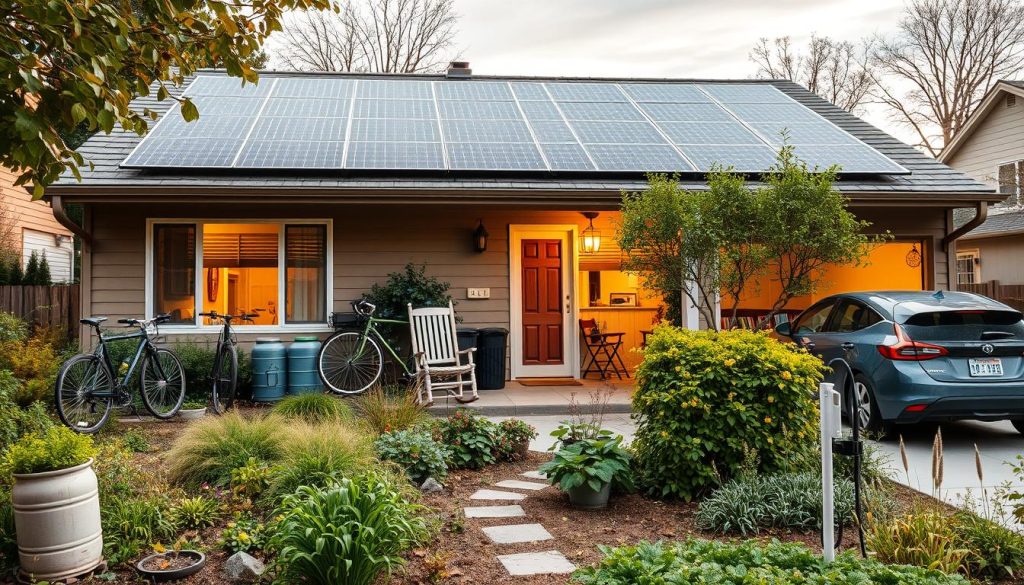
More homeowners are now choosing to be kinder to the earth. They look for ways to make their homes greener. These eco-friendly improvements lead to more efficient energy use and a healthier planet.
Installing Solar Panels
Putting solar panels on your roof is a great green move. They turn sunlight into electricity, cutting down our need for oil and gas. The Energy Saving Trust mentions you could save around £300 annually on your power bill. This shows how solar panels are good for both your wallet and the planet.
Energy-Efficient Appliances
Using appliances that need less power is another smart move. New tech, approved by the Building Research Establishment (BRE), uses electricity more wisely. This means smaller bills for you and less harm to the environment. It’s a key step towards making homes more eco-friendly.
Utilising Natural Light
Making more use of daylight can also help save energy. By positioning windows cleverly and adding skylights, you can rely less on electric lights. The National Homebuilding & Renovating Show says good design improves comfort and looks, and helps the earth, too.
Benefits of Zero-Waste Lifestyle
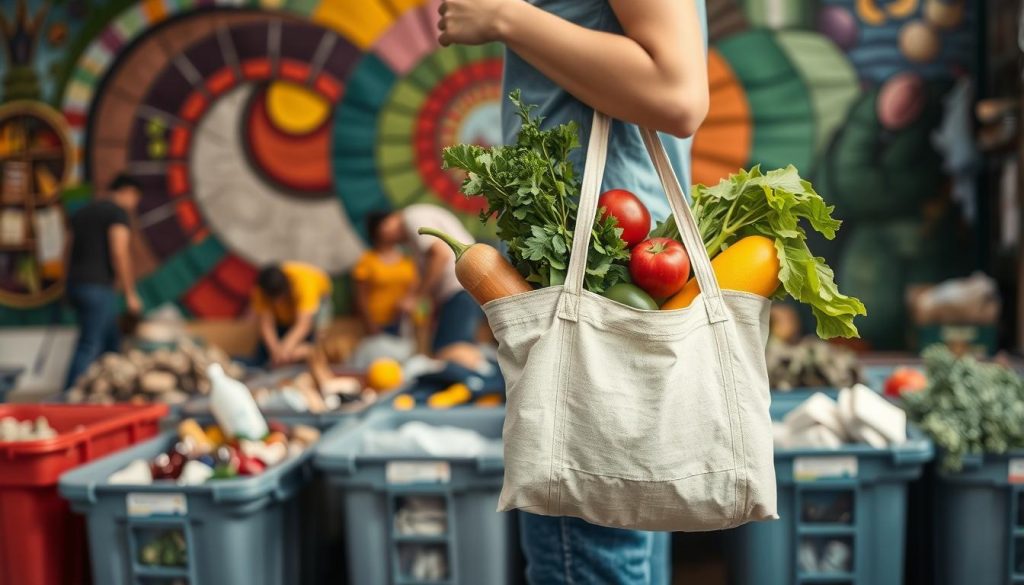
Adopting zero-waste habits offers ecological, economic, and social perks. This philosophy focuses on cutting waste by changing how products and habits work. It encourages smarter consumption and makes people and companies think about their environmental impact.
One big benefit is less landfill waste. Through composting, recycling, and upcycling, we can drastically cut down the trash we send to landfills. This action helps in reducing pollution and saving natural resources.
Sustainable buying is key in zero-waste living. Choosing products with less packaging, supporting green companies, and buying second-hand are ways to push the market to be more eco-friendly. This helps reduce the need for new materials and energy, making our economy more sustainable.
There are clear economic pluses to living waste-free. Families save money by reusing things instead of buying new. At the same time, local authorities spend less on rubbish handling. They can then support other vital services and boost the economy by creating eco-friendly jobs.
Zero-waste also improves community spirit and knowledge. Local shops and workshops bring people together to learn and care more about reducing waste. These activities build a shared duty to protect our planet.
WRAP in the UK works with companies and folks to manage resources better. The Ellen MacArthur Foundation promotes a circular economy that fits well with zero-waste goals.
In conclusion, going zero-waste is about more than just reducing rubbish. It’s a pledge to live sustainably, save money, and join a community working towards a better Earth.
Practising Sustainable Gardening
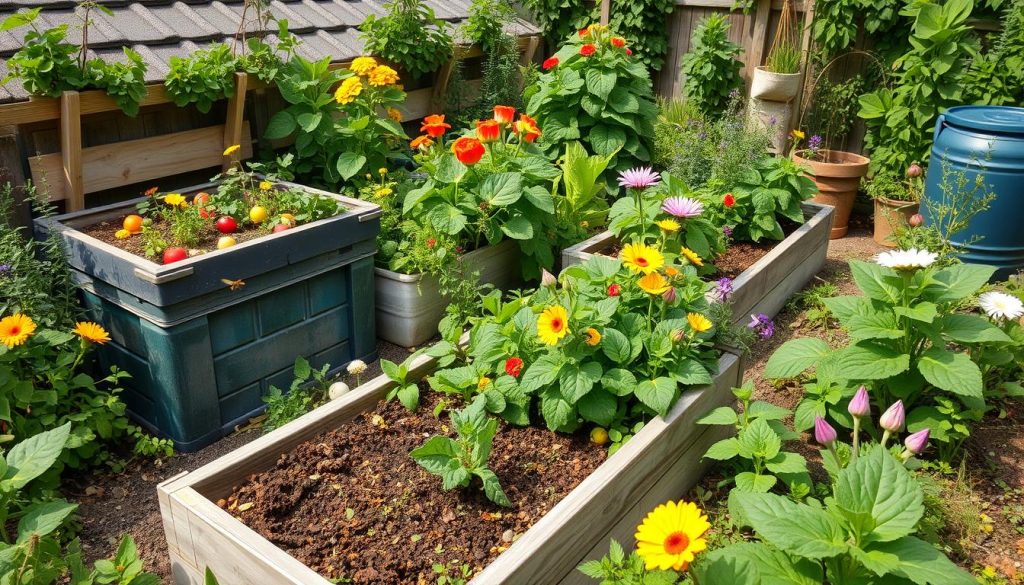
Sustainable gardening is a way to grow plants that’s good for the environment. Using organic methods, we get healthier plants. By composting and planting native species, we help local wildlife and increase garden diversity.
Composting at Home
Composting turns kitchen and garden waste into soil that’s full of nutrients. The Royal Horticultural Society says it’s key for rich soil. It keeps the soil moist, cuts down on trash, and starts with mixing veggie scraps with leaves and grass. Stirring it often makes the compost better faster.
Growing Native Plants
Choosing local plants boosts garden life. They need less water and less care, says The Wildlife Trusts. These plants help bugs thrive, which birds and animals love. Adding them supports our local environment’s health and strength.
Organic gardening does more than make our gardens look good. Groups like Garden Organic stand behind these ways. They help us grow lively, green spaces that help the planet.
Choosing Eco-Friendly Products
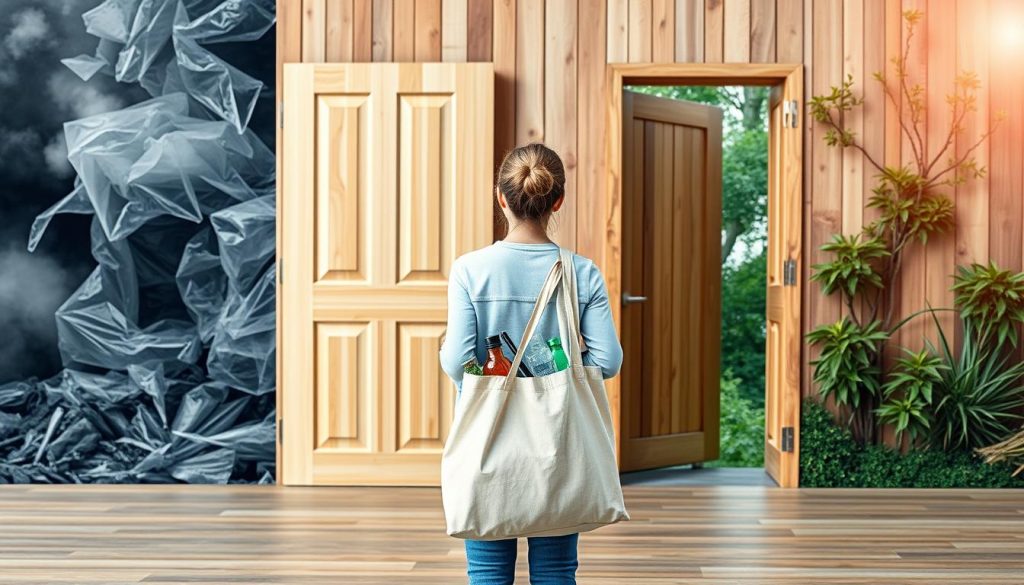
Making choices for the planet matters. Choosing items with eco-friendly packaging helps a lot. Using recycled stuff also makes a big difference. Plus, if we support green brands, we can push for better changes.
Biodegradable Packaging
Biodegradable packaging breaks down much faster than plastic. It’s made from things like corn starch or seaweed. Choosing these products cuts down plastic waste and urges companies to be more eco-conscious. It’s a step towards a cleaner world.
Recycled Materials
Items made from recycled materials are key for helping our planet. They lower the need for new resources, saving energy. Look for labels that show something is made from recycled stuff. It means you’re helping to keep the cycle going. This supports recycling efforts and encourages eco-friendly choices.
The Role of Renewable Energy
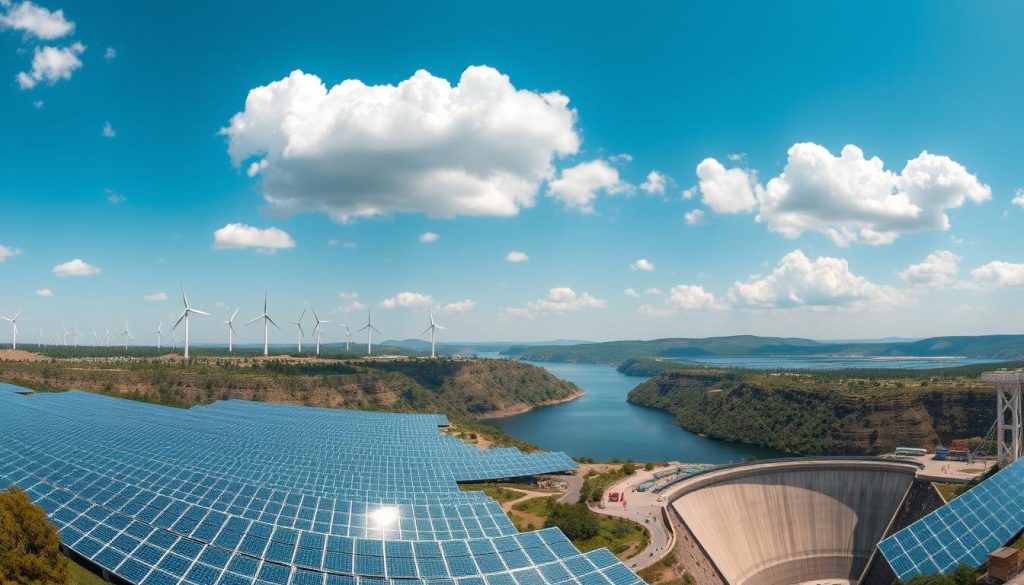
In the world of sustainability in energy, sources like wind, solar, and tidal energy are key. The UK is moving forward with these green power options. This marks a big change towards more sustainable choices.
The Renewable Energy Association tells us about the perks of renewable energy sources. Solar and wind power help us get to a future without carbon emissions. Government perks are also helping, making green power more appealing to businesses and homes.
Real-life examples show us how good these changes can be. They not only cut down on carbon emissions. They also improve energy security, decrease our need for fossil fuels, and open up new job opportunities in the energy sector.
Also, the Department for Business, Energy & Industrial Strategy talks about how policy frameworks help. They encourage innovative green power solutions that are good for the long term. These policies help with big renewable energy projects that help the UK meet its climate targets.
The National Grid ESO is putting renewable energy into action with big investments. These investments make our energy grid stronger and more sustainable. By bringing in more renewable sources, we tackle immediate environmental problems. We’re also preparing for a future where our energy is sustainable for everyone.
Reducing Plastic Use
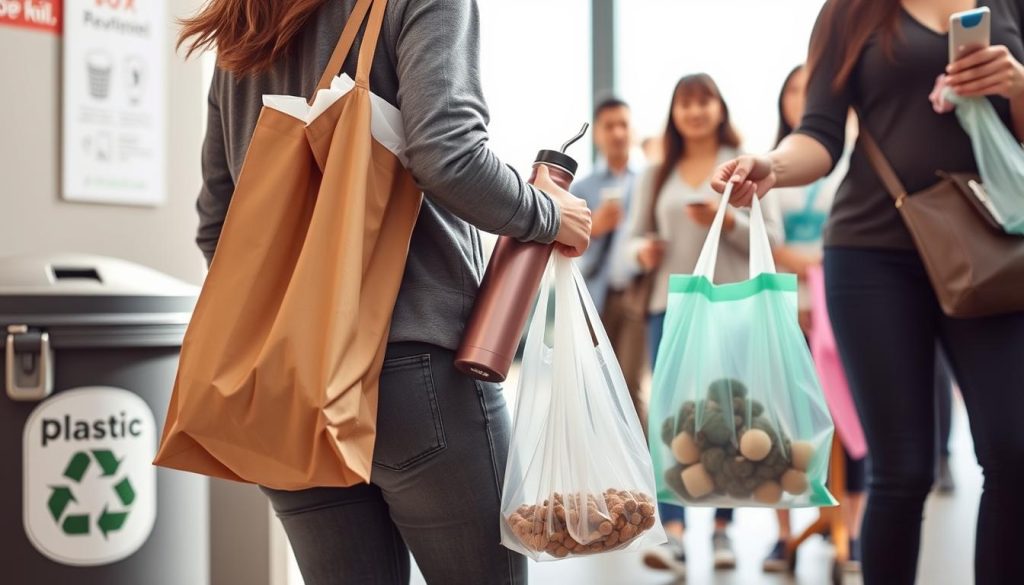
Plastic overuse is harming our oceans and wildlife. We must cut down on plastic to help the planet. Groups like Surfers Against Sewage and the Plastic Pollution Coalition show us how.
Alternative Packaging Solutions
Finding new ways to package products is key. We can use things that break down, can be composted, or are made from recycled materials. This helps the earth and makes customers who care about the environment want to support these brands.
Reusable Containers
Choosing reusable items is important for our planet. It means we use less plastic that can be thrown away after one use. Organisations like Keep Britain Tidy are pushing for more people to use items that can be used many times. This move towards using less plastic is crucial for protecting nature.
Eco-Friendly Travel Tips
Going on trips while thinking about our planet is crucial. We must embrace sustainable tourism to lessen our environmental impact. These green travel practices are good to follow:
- Choose eco-friendly accommodations: Pick places to stay that care for the environment. Look for those approved by Green Tourism or The International Ecotourism Society.
- Minimise air travel: Use trains or buses when you can to cut down on emissions. If flying is a must, choose direct flights to reduce CO2.
- Pack light: Taking less with you not only makes your journey easier but also helps save fuel.
- Carry reusable items: Using items like refillable water bottles and cloth bags reduces plastic waste.
- Support local businesses: Shopping and eating locally helps the community and cuts the carbon footprint of your purchases.
By following these tips, you can travel the world in a responsible way. Sustainable tourism and green travel practices not only enhance our trips but also protect our environment for the future.
Supporting Sustainable Businesses
Now more than ever, it’s vital to back companies that follow ethical business rules. By choosing sustainable and fair trade efforts, we can really make a difference. This helps both our local communities and the worldwide market.
Fair Trade Products
Buying fair trade items is key to promoting honest business ways. These products make sure producers get fair pay and treatment. The Fairtrade Foundation helps a lot by making sure these items are up to strict standards.
Local Produce
Choosing local food helps cut down on pollution and backs local farmers. Fruits, veggies, and other local foods lower the energy needed for transportation. This support helps local growers do well. The Soil Association supports sustainable farming, making it easier to find and help local food suppliers.
To find these ethical companies, look for special certifications and support local markets and shops. Sustain – The Alliance for Better Food and Farming – offers lots of info to help make smart choices.
Implementing Recycling Programs at Home
Creating recycling programs at home is key for better waste management. The first step is learning about waste segregation. This means sorting your waste into groups like paper, plastics, metals, and food. Doing this makes recycling easier and ensures materials are handled right.
Local councils give guidelines on how to dispose of materials properly. Sites like Recycle Now share this information. Following these rules makes your recycling efforts at home more effective. For example, separating food for compost and paper products boosts home recycling solutions.
Organisations like Zero Waste Scotland share tips to improve recycling. Steps include rinsing containers before recycling. They also advise against mixing recyclable with non-recyclable waste. These actions help in practicing detailed recycling and better domestic waste management.
The Waste & Resources Action Programme (WRAP) suggests checking your recycling habits often. Reviewing and enhancing these habits helps keep up with the latest advice. This also helps the environment.
In conclusion, good home recycling solutions require following local advice. They also need looking for trustworthy resources and keeping up consistent sorting of waste. These steps greatly improve recycling success and waste management at home.
The Impact of Meat Consumption on the Environment
The discussion about meat’s impact on our planet has become more common. Deforestation, water shortages, and climate change are big problems caused by making lots of meat. The Vegan Society has done key research showing how much eating meat affects our environment. Choosing to eat more plants could help lessen these problems.
Benefits of Plant-Based Diets
Going plant-based is good for you and the earth. The Sustainable Restaurant Association found that plants cause less climate pollution and use less water. Eating more plant-based foods can help us live more sustainably, making a smaller impact on our planet.
Sustainable Meat Alternatives
If you’re not ready to stop eating meat completely, there are still good options. Things like lab-grown meat and plant-based products from Beyond Meat and Quorn are better for the environment. The Soil Association believes these choices can help us eat in a way that protects the earth.
We need to think about meat’s impact on the environment for a better future. Moving towards plant-based eating or choosing sustainable meat options are good steps. They can help us lessen our harm to the earth.
The Concept of Circular Economy
A circular economy aims to keep materials in use for as long as possible. This means reusing, recycling, and updating items instead of throwing them away. It helps us use fewer resources and create less waste. Moving to a circular way of working changes how we grow, benefiting both the planet and people.
Design for Durability
Making products last longer is a key idea in the circular economy. Companies like Patagonia and IKEA make sure their products can be used for a long time. This means you don’t need to buy new things as often. Products that last help save resources and make customers happy. They also encourage us to buy less and use things longer.
Recycling and Repurposing
Recycling and finding new uses for things are central to the circular economy. This can greatly help our planet. The Ellen MacArthur Foundation says switching to this way of working could cut global emissions by almost half by 2030. New ideas for old materials also spark creativity. Groups like WRAP and Green Alliance lead the change in the UK.
Educational Resources on Sustainability
Living sustainably is a journey that requires the right knowledge. Education on sustainability helps us understand how our actions affect the environment. Many platforms in the UK offer materials on sustainability and environmental learning to guide this journey.
The Sustainable Schools Alliance is at the forefront of this initiative. It provides schools with tools and guidance to include sustainability in their curriculum. Students can access green resources, teaching materials, case studies, and workshops to develop a sustainability mindset.
Eco-Schools is another great resource that involves students and teachers across the UK. This programme promotes activities that enhance biodiversity, cut waste, and save water and energy. Schools taking part can earn a Green Flag award, showing they excel in environmental practices.
For those wanting to learn more about the environment, the Forum for the Future is perfect. It works with businesses and governments to promote sustainability. Their resources include detailed reports, new sustainability ideas, and training to tackle environmental issues.

